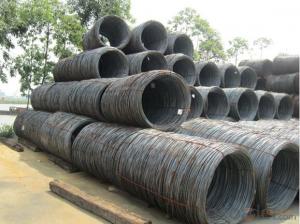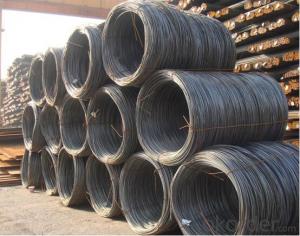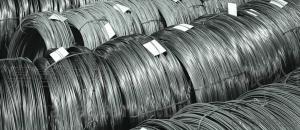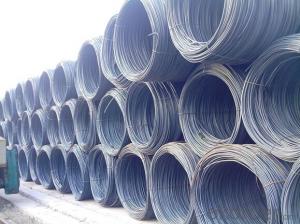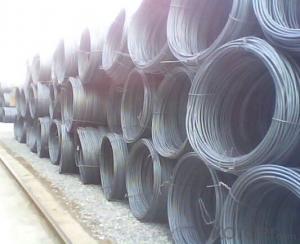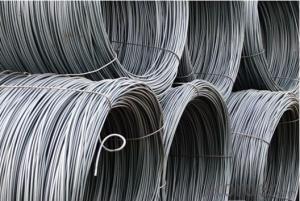Grade 304 Stainless Steel wire rod in Coils
- Loading Port:
- Tianjin
- Payment Terms:
- TT OR LC
- Min Order Qty:
- 3 m.t.
- Supply Capability:
- 10000 m.t./month
OKorder Service Pledge
Quality Product, Order Online Tracking, Timely Delivery
OKorder Financial Service
Credit Rating, Credit Services, Credit Purchasing
You Might Also Like
Item specifice
Type:
Carbon Steel,Spring Steel,Bearing Steel,Gear Steel,Deformed Steel,Stainless Steel,Alloy Steel
Shape:
Steel Coil,Steel Sheet,Steel Wire Rod,Steel Flat Bar,Steel Square Bar,Steel Angle,Steel Round Bar,Steel Billets
Technique:
Hot Rolled,Cold Rolled,Cold Drawn,ERW,Forged,Saw,Extruded,EFW,Spring
Surface Treatment:
Galvanized,Coated,Copper Coated,Color Coated,Oiled,Dry,Chromed Passivation,Polished,Bright,Black,PVDF Coated
Certification:
ISO,SGS,BV,IBR,RoHS,CE,API,BSI,UL
Thickness:
0.01-3.0mm
Width:
0.01-3.0mm
Length:
In coils
Outer Diameter:
0.01-3.0mm
Net Weight:
2m.t.
Packaging:
Seaworthy packaging
Grade 304 Stainless Steel wire rod in Coils
Detailed Information of the Grade 304 Stainless Steel wire rod in Coils
| Name | Hot Rolled High Carbon Wire Rod |
| Shape | Round Bar/Square Bar/Flat Bar/Plate/Wire |
| Standard | GB/ASTM/SAE/AISI/DIN/JIS/EN/BS |
| Surface Treatment: | Black/Peeling/Polished/Machined |
| Delivery Condition: | Hot Rolled or Forged/Peeled or Black Surface |
| Test | SGS/UT 100% Elements Testing |
| Certificate: | ISO/Mill Certificate |
| Service: | 24 hours online service / |
| more than 20 years trading and manufacture | |
| Quality Assurance: | the third party inspection, such as SGS, BV, TUV…etc. is acceptable |
| Packaging Details: | Seaworthy Packaging or as per customer's packing instruction |
Chemical Composition of the Grade 304 Stainless Steel wire rod in Coils
| Grade | Chemical Composition(%) | |||||
| C | Mn | Si | S | P | B | |
| SAE1008 | 0.1max. | 0.3~0.50 | 0.15max | 0.050max | ≤0.040 | >0.0008 |
| Mechanical properties | ||||||
| Yield strength(N/mm2) | Tensile strength(N/mm2) | Elongation(%) | ||||
| 250-280 | 350-380 | ≥32 | ||||
Company Introduction the Grade 304 Stainless Steel wire rod in Coils
CNBM International Corporation is the most import and export platform of CNBM group(China National Building Material Group Corporation) ,which is a state-owned enterprise, ranked in 270th of Fortune Global 500 in 2015.
With its advantages, CNBM International are mainly concentrate on Cement, Glass, Iron and Steel, Ceramics industries and devotes herself for supplying high quality series of refractories as well as technical consultancies and logistics solution.
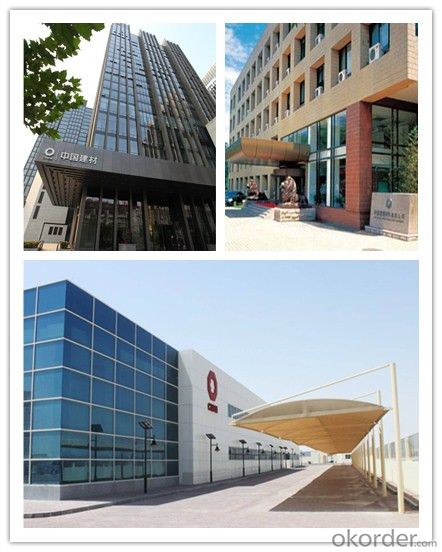
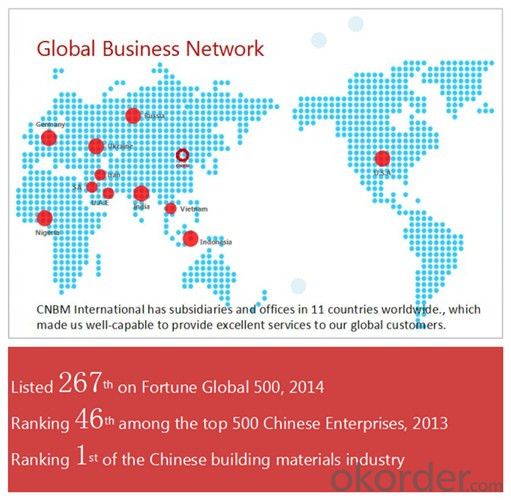
| After-sale service | CNBM provides the services and support you need for every step of our cooperation. We’re the business partners you can trust; you can relax and get on with doing business. |
| For any problem, please kindly contact us at any your convenient time, we’ll reply you in our first priority within 24 hours | |
| Advantages | Industry experience over 20 years. |
| Shipment of goods -More than 70 countries worldwide. | |
| The most convenient transport and prompt delivery. | |
| Competitive price with best service. | |
| High technical production line with top quality products. | |
| High reputation based on best quality products. |
Packaging & Delivery the Grade 304 Stainless Steel wire rod in Coils
| Packaging Detail | Sea worthy packing /as per customer's packing instruction |
| Delivery Detail | 15 ~ 40 days after receiving the deposit |
Products Show
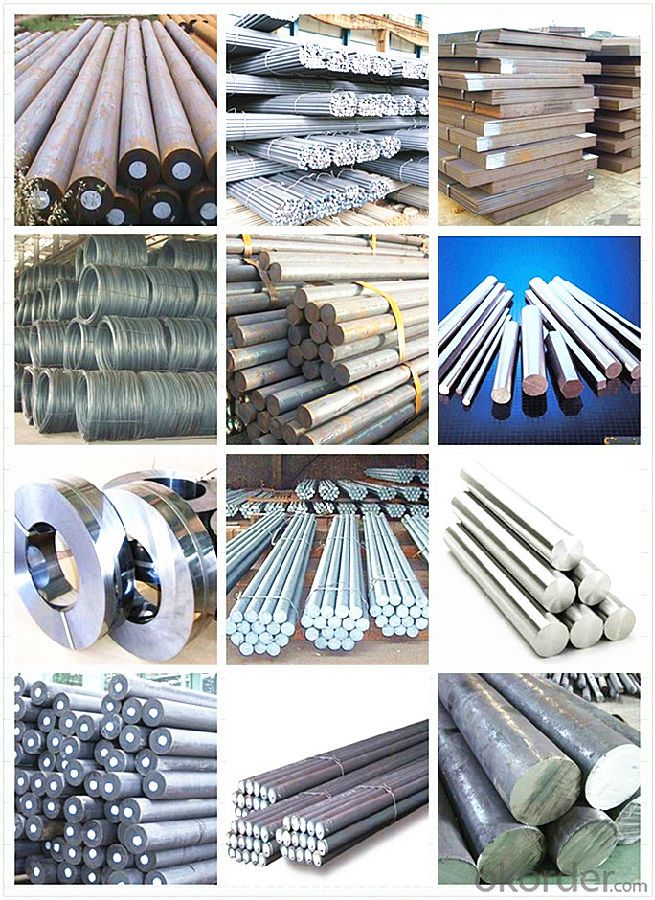
FAQ:
| Are you a trader or manufacturer? | Manufacturer |
| What’s the MOQ? | 3 metric ton |
| What’s your delivery time? | 15-35 days after downpayment received |
| Do you Accept OEM service? | Yes |
| what’s your delivery terms? | FOB/CFR/CIF |
| What's the Payment Terms? | 30% as deposit,70% before shipment by T/T |
| Western Union acceptable for small amount. | |
| L/C acceptable for large amount. | |
| Scrow ,Paybal,Alipay are also ok | |
| Why choose us? | Chose happens because of quality, then price, We can give you both. |
| Additionally, we can also offer professional products inquiry, products knowledge train (for agents), smooth goods delivery, excellent customer solution proposals. | |
| What's your available port of Shipment? | Main Port, China |
| What’s your featured services? | Our service formula: good quality+ good price+ good service=customer's trust |
| Where are your Market? | Covering more than 160 countries in the world |
- Q:What are the different automotive grades of special steel?
- There are several different automotive grades of special steel used in the automotive industry. These grades are specifically designed to meet the unique requirements and demands of the automotive sector. Some of the commonly used grades include: 1. Advanced High-Strength Steels (AHSS): These grades of steel are known for their exceptional strength and excellent formability. AHSS is used in critical automotive components like chassis, body panels, and safety systems to enhance crash performance while reducing weight. 2. Dual-Phase Steels (DP): DP steels are a type of AHSS that offer a combination of high strength and good ductility. They are commonly used in automotive applications that require both strength and formability, such as structural components and reinforcements. 3. Martensitic Steels: These steels are known for their high strength and hardness. They are often used in automotive applications that require resistance to wear and impact, such as crankshafts, gears, and axles. 4. Transformation-Induced Plasticity (TRIP) Steels: TRIP steels are designed to provide high strength, good formability, and excellent energy absorption during impact. They are utilized in automotive safety components like bumper reinforcements and crash boxes. 5. High-Strength Low-Alloy (HSLA) Steels: HSLA steels offer a balance between strength, formability, and cost-effectiveness. They are commonly used in automotive structural components and suspension systems to reduce weight while maintaining structural integrity. 6. Stainless Steels: Stainless steels are corrosion-resistant and are used in automotive applications that require resistance to rust and corrosion, such as exhaust systems, fuel tanks, and decorative trims. These different grades of special steel provide automotive manufacturers with a wide range of options to meet specific needs in terms of strength, formability, durability, and corrosion resistance. The selection of the appropriate grade depends on the intended application and the desired performance characteristics.
- Q:What are the main factors that affect the machinability of special steel?
- The machinability of special steel can be influenced by several factors. One of the main factors is the composition of the steel itself. Special steels often have complex alloys added to enhance their properties, such as increased strength or corrosion resistance. However, these alloying elements can also have a negative impact on machinability. Elements like chromium, nickel, and molybdenum can cause the steel to become more difficult to machine due to their hardening or abrasive properties. Another factor that affects machinability is the microstructure of the steel. Special steels can undergo various heat treatments to achieve desired properties, but these treatments can also change the microstructure of the material. For example, the presence of carbides or precipitates can make the steel harder and more brittle, leading to increased tool wear and poorer machinability. The hardness of the steel is another important factor. Harder steels generally have lower machinability as they are more resistant to cutting forces. High-speed steels, which are commonly used for machining, can be used to counteract this issue to some extent. However, excessively hard steels may require specialized tooling or machining techniques to achieve satisfactory results. The presence of impurities or non-metallic inclusions in the steel can also affect machinability. These impurities can disrupt the cutting process, leading to reduced tool life and surface finish. Special steel manufacturers often strive to minimize impurities and control inclusion content to improve machinability. Lastly, the cutting parameters and machining conditions play a significant role in determining machinability. Factors such as cutting speed, feed rate, and depth of cut need to be optimized to achieve the best balance between material removal rate and tool life. Coolant usage and chip evacuation are also crucial considerations to prevent excessive heat buildup and chip recutting, which can negatively impact machinability. In summary, the main factors that affect the machinability of special steel include composition, microstructure, hardness, impurities, and cutting parameters. Understanding these factors and applying appropriate machining techniques can help maximize productivity and achieve high-quality machined components from special steels.
- Q:How does special steel contribute to the marine aftermarket industry?
- Special steel contributes to the marine aftermarket industry by providing high-strength and corrosion-resistant materials for various marine components and structures. This type of steel is essential for manufacturing propellers, shafts, valves, and other critical parts that ensure the performance and longevity of marine vessels. Additionally, special steel enables the construction of lighter and more fuel-efficient ships, reducing operating costs and environmental impact. Overall, the use of special steel in the marine aftermarket industry enhances safety, efficiency, and sustainability in the maritime sector.
- Q:What are the main applications of special steel in the oil and gas equipment?
- Special steel is widely used in the oil and gas equipment industry due to its exceptional properties such as high strength, corrosion resistance, and heat resistance. Some of the main applications of special steel in this industry include manufacturing of drilling equipment, pipelines, valves, fittings, and other critical components. Special steel ensures the durability and reliability of these equipment in harsh environments, such as offshore drilling, where they are subjected to extreme temperatures, high pressures, and corrosive substances.
- Q:What are the recycling options for special steel?
- There are several recycling options available for special steel. One option is to take it to a local scrap yard or metal recycling facility. These facilities have the necessary equipment to process and recycle special steel. They will typically pay you for the steel based on its weight and current market value. Another option is to contact a specialized recycling company that deals specifically with special steel. These companies have expertise in handling and recycling this type of steel and can ensure that it is properly processed and reused. Additionally, some steel manufacturers and distributors have their own recycling programs in place. They may offer take-back programs where they will collect and recycle special steel from their customers. This can be a convenient option as it eliminates the need to find a separate recycling facility. It is important to note that special steel may require special handling and processing due to its unique properties. Therefore, it is recommended to consult with a professional or contact the recycling facility or company beforehand to ensure that they can properly handle and recycle the specific type of special steel you have.
- Q:How does special steel contribute to the aerospace turbine industry?
- The aerospace turbine industry greatly relies on special steel due to its unique advantages that cannot be found in other materials. Special steel is renowned for its exceptional strength and durability, making it perfect for enduring the extreme conditions within aerospace turbines. The demanding temperatures, pressures, and rotational speeds experienced by turbine components necessitate a material that can withstand these harsh conditions without compromising performance or safety. Furthermore, special steel demonstrates excellent heat resistance and corrosion resistance properties, which are vital for the longevity of turbine components. Its ability to resist oxidation and corrosion enables special steel to maintain its structural integrity and functionality over extended periods, reducing the need for frequent maintenance or replacement. Moreover, special steel offers outstanding machinability and formability, enabling the production of intricate and complex turbine components. This facilitates the creation of highly efficient and precisely engineered turbine blades, vanes, and other crucial parts necessary for the optimal performance of aerospace turbines. Additionally, special steel provides the necessary characteristics for enhanced fuel efficiency in aerospace turbines. By utilizing high-strength special steel alloys, turbine manufacturers can design lighter and more aerodynamic components, resulting in reduced overall weight and drag. Consequently, this leads to increased fuel efficiency and lower emissions, contributing to a more sustainable and environmentally friendly aviation industry. In conclusion, special steel plays a vital role in the aerospace turbine industry by delivering the required strength, durability, heat resistance, corrosion resistance, and machinability essential for the efficient and dependable operation of turbine components. Its contribution extends to improved fuel efficiency, reduced maintenance needs, and enhanced overall performance, establishing it as an indispensable material for the aerospace turbine industry.
- Q:Can special steel be used in the pharmaceutical manufacturing industry?
- No, special steel is not typically used in the pharmaceutical manufacturing industry. The industry requires specific materials, such as stainless steel, that meet strict regulatory requirements for cleanliness, corrosion resistance, and compatibility with pharmaceutical products.
- Q:What are the properties of corrosion-resistant stainless tool steel?
- Corrosion-resistant stainless tool steel possesses several properties that make it highly suitable for various applications. Firstly, it exhibits exceptional resistance to corrosion, even in harsh environments, due to the presence of a high percentage of chromium in its composition. This resistance helps prevent the formation of rust, stains, or pitting, ensuring durability and longevity. Additionally, this type of steel maintains its mechanical strength and hardness at elevated temperatures, making it ideal for tools and equipment subjected to high heat or wear. Furthermore, corrosion-resistant stainless tool steel offers excellent machinability, allowing for ease of shaping, cutting, and forming. Its combination of corrosion resistance, strength, and machinability makes it a popular choice for various industries, including manufacturing, construction, and automotive.
- Q:How does special steel contribute to the manufacturing of consumer goods?
- Consumer goods manufacturing greatly relies on special steel to enhance the durability, strength, and performance of various products. This type of steel is specifically engineered with unique properties and alloys to meet the demanding standards of the industry. One way in which special steel significantly contributes to consumer goods manufacturing is through its exceptional strength and durability. It forms a solid foundation for products that need to endure heavy use, such as kitchen appliances, power tools, and automotive components. The strength of special steel guarantees that these products can withstand daily wear and tear, resulting in longer lifespans and reduced maintenance costs for consumers. Additionally, the corrosion resistance properties of special steel make it an ideal material for consumer goods exposed to harsh environments or moisture. This is particularly crucial for products like kitchen utensils, cutlery, and bathroom fixtures, as they frequently come into contact with water or corrosive substances. By incorporating special steel, manufacturers can ensure that their products remain free from rust and maintain their aesthetic appeal over time. Furthermore, special steel offers enhanced performance capabilities. For example, it can be utilized in the manufacturing of consumer goods requiring high heat resistance, such as cooking appliances and automotive engine components. Special steel's ability to withstand extreme temperatures without deforming or losing its properties makes it an essential material for these applications. Moreover, the versatility of special steel allows it to be customized to meet specific consumer needs. Manufacturers have a wide range of special steel alloys with varying characteristics to choose from, enabling them to optimize the performance of their products. This flexibility enables the production of personalized consumer goods that meet specific requirements, whether it involves lightweight materials for portable electronics or impact-resistant components for sporting equipment. Overall, special steel plays a vital role in consumer goods manufacturing by providing strength, durability, corrosion resistance, and enhanced performance. Its unique properties contribute to the production of high-quality products that can withstand heavy use, offer extended lifespans, and ensure customer satisfaction.
- Q:How does special steel contribute to the wear resistance of products?
- Special steel contributes to the wear resistance of products by offering superior hardness, strength, and durability compared to regular steel. Its unique composition, which may include additional alloying elements like chromium, nickel, or molybdenum, enhances its ability to withstand friction, abrasion, and other forms of wear. This enables products made from special steel to have a longer lifespan and perform effectively in demanding applications, reducing the need for frequent replacements and maintenance.
1. Manufacturer Overview |
|
|---|---|
| Location | |
| Year Established | |
| Annual Output Value | |
| Main Markets | |
| Company Certifications | |
2. Manufacturer Certificates |
|
|---|---|
| a) Certification Name | |
| Range | |
| Reference | |
| Validity Period | |
3. Manufacturer Capability |
|
|---|---|
| a)Trade Capacity | |
| Nearest Port | |
| Export Percentage | |
| No.of Employees in Trade Department | |
| Language Spoken: | |
| b)Factory Information | |
| Factory Size: | |
| No. of Production Lines | |
| Contract Manufacturing | |
| Product Price Range | |
Send your message to us
Grade 304 Stainless Steel wire rod in Coils
- Loading Port:
- Tianjin
- Payment Terms:
- TT OR LC
- Min Order Qty:
- 3 m.t.
- Supply Capability:
- 10000 m.t./month
OKorder Service Pledge
Quality Product, Order Online Tracking, Timely Delivery
OKorder Financial Service
Credit Rating, Credit Services, Credit Purchasing
Similar products
New products
Hot products
Related keywords
